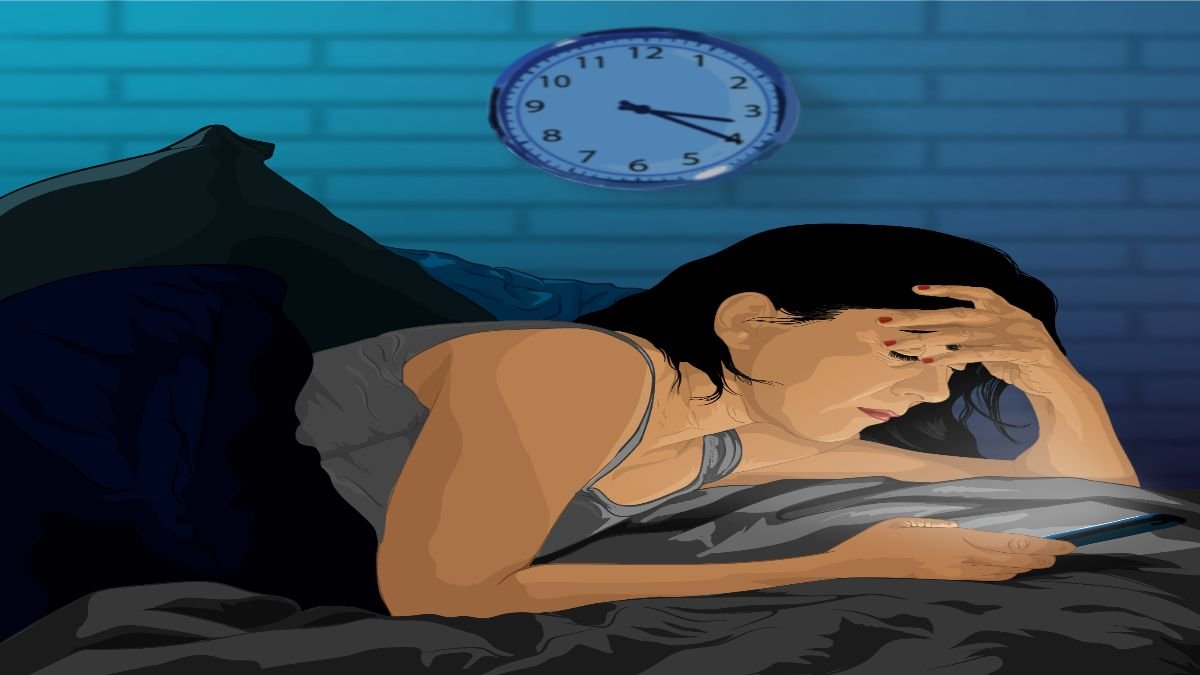Overview
Insomnia is a common sleep disorder that affects millions of people worldwide. It is characterized by difficulty falling asleep, staying asleep, or waking up too early and not being able to go back to sleep.
Chronic insomnia can lead to long-term health issues, including fatigue, mood disturbances, and difficulty concentrating, ultimately impacting overall quality of life.
Occasional sleeplessness is normal, but when insomnia becomes persistent, it requires attention and management.
In this blog, we will delve into what insomnia is, its symptoms, causes, risk factors, complications, diagnosis, treatment options, and prevention strategies.
Table of Contents
What is Insomnia?

Insomnia is a sleep disorder that makes it difficult for individuals to fall asleep, stay asleep, or get restorative sleep. People with insomnia may wake up frequently during the night or wake up too early in the morning, feeling unrefreshed and tired throughout the day.
Types of Insomnia:
Insomnia can be classified into two types:
1. Acute Insomnia: This is short-term insomnia that lasts for a few days or weeks, often due to stress or a significant life event, such as a job change, illness, or loss of a loved one.
2. Chronic Insomnia: This is long-term insomnia that occurs at least three nights a week and persists for three months or more. Chronic insomnia often results from underlying medical or psychological conditions.
Insomnia can occur on its own (primary insomnia) or as a result of another condition, such as depression or anxiety (secondary insomnia). It affects people of all ages and can severely impact physical and mental health if left untreated.
Symptoms of Insomnia
Insomnia can manifest in different ways, and the severity of symptoms may vary from person to person. The most common symptoms of insomnia include:
- Difficulty falling asleep: Many people with insomnia find it hard to relax and fall asleep, often staying awake for long periods at night.
- Waking up frequently during the night: Insomniacs may wake up multiple times during the night and struggle to go back to sleep.
- Waking up too early: Some individuals wake up much earlier than they need to and are unable to go back to sleep, leading to insufficient rest.
- Daytime sleepiness: People with insomnia often feel fatigued, drowsy, or tired during the day due to poor-quality sleep.
- Irritability or mood disturbances: Insomnia can lead to increased irritability, anxiety, depression, and mood swings.
- Difficulty concentrating: Lack of sleep may affect cognitive functions, making it harder to focus, concentrate, or remember things.
- Decreased performance at work or school: Insomnia can lead to reduced productivity and difficulty completing tasks.
If insomnia persists and becomes chronic, it can contribute to serious health problems, including heart disease, hypertension, diabetes, and mental health disorders.
Causes of Insomnia
There are many potential causes of insomnia, ranging from lifestyle factors to underlying health conditions. The most common causes include:
- Stress: Financial worries, work pressure, relationship problems, or significant life changes can all trigger insomnia. Stress can keep the mind active at night, making it hard to relax and fall asleep.
- Mental health disorders: Anxiety, depression, and other mental health conditions are often linked to insomnia. These conditions can cause persistent worrying, negative thoughts, or emotional disturbances that prevent restful sleep.
- Poor sleep habits: Irregular sleep schedules, exposure to screens before bed, consuming caffeine or nicotine late in the day, and engaging in stimulating activities before bedtime can all disrupt the body’s natural sleep-wake cycle.
- Medications: Certain medications, including those for asthma, heart disease, allergies, and antidepressants, can interfere with sleep patterns.
- Chronic pain: Conditions such as arthritis, back pain, and fibromyalgia can make it difficult to find a comfortable sleeping position, leading to insomnia.
- Sleep disorders: Conditions like sleep apnea, restless leg syndrome, and circadian rhythm disorders can contribute to insomnia by disrupting sleep during the night.
- Environmental factors: A noisy, bright, or uncomfortable sleeping environment can prevent restful sleep. Jet lag, shift work, or frequent travel across time zones can also affect sleep patterns.
Risk Factors for Insomnia
Certain factors can increase the likelihood of developing insomnia, including:
- Age: Insomnia is more common in older adults due to changes in sleep patterns and medical conditions that can interfere with sleep.
- Gender: Women are more likely than men to experience insomnia, especially during hormonal changes such as pregnancy, menopause, or menstrual cycles.
- Chronic medical conditions: People with chronic conditions like asthma, arthritis, heart disease, or gastrointestinal problems are at higher risk of developing insomnia.
- Mental health disorders: Individuals with anxiety, depression, PTSD, or other mental health conditions are more prone to insomnia.
- High stress levels: Those who frequently experience high levels of stress or have demanding jobs may struggle with insomnia.
- Shift work: People who work irregular hours or night shifts may have difficulty maintaining a consistent sleep schedule, leading to insomnia.
Complications of Insomnia
Chronic insomnia can lead to several physical, emotional, and cognitive complications, including:
- Daytime fatigue: Persistent tiredness and lack of energy can make it difficult to carry out daily activities and enjoy life.
- Increased risk of accidents: Sleep deprivation impairs concentration and reaction times, increasing the likelihood of accidents, particularly in driving or operating machinery.
- Poor mental health: Insomnia is closely linked to anxiety, depression, and other mental health issues. Prolonged insomnia can worsen these conditions.
- Lowered immunity: Sleep is essential for maintaining a healthy immune system, and chronic insomnia can make you more susceptible to infections and illnesses.
- Reduced cognitive function: Difficulty concentrating, poor memory, and slow problem-solving skills are common cognitive consequences of insomnia.
- Risk of chronic health conditions: Long-term sleep deprivation is associated with an increased risk of heart disease, high blood pressure, diabetes, and stroke.
Diagnosis of Insomnia
To diagnose insomnia, a healthcare provider will typically:
Review your medical history: Your doctor will ask about your sleep patterns, daily habits, medical conditions, and any medications you are taking.
Conduct a sleep study: In some cases, you may undergo a sleep study (polysomnography) to measure brain activity, heart rate, breathing patterns, and movements during sleep.
Use sleep questionnaires: Tools like the Insomnia Severity Index or sleep diaries may be used to track your sleep habits and identify potential causes of insomnia.
Based on the information gathered, your doctor can determine whether you have insomnia and what type of treatment is most appropriate.
Treatment for Insomnia
Treatment for insomnia focuses on improving sleep quality and addressing the underlying causes. Common treatment options include:
1. Cognitive Behavioral Therapy for Insomnia (CBT-I):
- CBT-I is a structured, evidence-based approach that helps individuals identify and change negative thought patterns and behaviors that contribute to insomnia. It is one of the most effective treatments for chronic insomnia.
- Techniques include sleep restriction therapy, stimulus control, and relaxation exercises to improve sleep hygiene and promote better sleep.
2. Medications:
- Prescription sleep aids: Doctors may prescribe short-term use of sleep medications such as benzodiazepines or non-benzodiazepine hypnotics to help you fall asleep or stay asleep.
- Over-the-counter sleep aids: Some individuals may use over-the-counter sleep medications or melatonin supplements to regulate their sleep-wake cycle. However, these should be used cautiously and under medical supervision.
3. Lifestyle Changes:
- Improve sleep hygiene: Establishing a consistent sleep schedule, avoiding caffeine and heavy meals before bed, and creating a relaxing bedtime routine can help promote better sleep.
- Exercise regularly: Physical activity during the day can improve sleep quality, but avoid exercising close to bedtime as it may make it harder to fall asleep.
- Manage stress: Stress-reduction techniques such as meditation, yoga, deep breathing, or mindfulness can help ease anxiety and improve sleep.
Prevention of Insomnia
Preventing insomnia often involves adopting healthy sleep habits and making lifestyle adjustments. Here are some strategies to help prevent insomnia:
- Establish a regular sleep routine: Go to bed and wake up at the same time every day, even on weekends, to regulate your internal clock.
- Create a sleep-friendly environment: Ensure that your bedroom is quiet, dark, and cool. Invest in a comfortable mattress and pillows to create a relaxing sleep space.
- Limit screen time before bed: Avoid electronic devices such as smartphones, tablets, and televisions at least an hour before bedtime, as the blue light emitted by these devices can interfere with melatonin production.
- Watch your diet: Avoid large meals, caffeine, alcohol, and nicotine close to bedtime, as they can disrupt your sleep.
- Incorporate relaxation techniques: Engage in calming activities before bed, such as reading, taking a warm bath, or practicing meditation to relax your body and mind.
- Stay active: Regular physical activity can help you fall asleep faster and enjoy deeper sleep but try to complete your workout several hours before bedtime.
Conclusion
Insomnia is a common but manageable sleep disorder that can have a significant impact on an individual’s physical and mental health.
Understanding the causes, symptoms, and available treatments can help individuals take steps toward better sleep.
Whether through cognitive behavioral therapy, medication, or lifestyle changes, managing insomnia is possible.
If you are struggling with persistent insomnia, it is important to seek help from a healthcare professional to identify the underlying causes and develop an appropriate treatment plan for restful, restorative sleep.
Frequently Asked Questions (FAQs)
1. How long does insomnia typically last?
Insomnia can last for a few days (acute insomnia) or persist for months or even years (chronic insomnia). The duration depends on the underlying causes and how quickly it is addressed.
2. Is insomnia a sign of a serious health condition?
Insomnia can be a symptom of an underlying medical condition, such as anxiety, depression, or sleep apnea. It is important to seek medical advice if insomnia persists.
3. Can lifestyle changes alone treat insomnia?
For mild cases of insomnia, lifestyle changes such as improving sleep hygiene, reducing stress, and maintaining a consistent sleep routine can be very effective. In more severe cases, therapy or medication may be required.
4. Is it safe to use sleep medications for insomnia?
While sleep medications can be helpful for short-term use, they should not be relied on for long-term treatment. Prolonged use can lead to dependency, tolerance, and other side effects. Always consult a healthcare provider before using sleep aids.
5. Can insomnia go away on its own?
Acute insomnia often resolves on its own when the triggering stressor is addressed. However, chronic insomnia may require medical intervention, therapy, or lifestyle changes to improve sleep quality.

